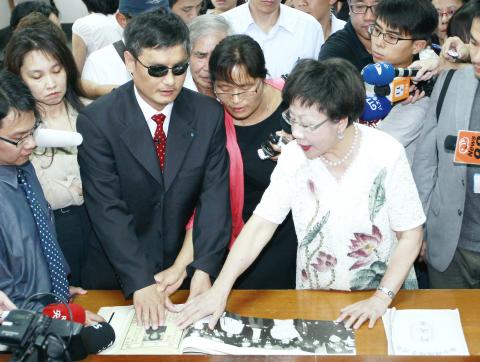Booming social and rights activism in China will bring change to China someday, in the same way that Taiwanese fought for and brought about democracy to their country, but Chinese rights activists deserve more support from the international community, Chinese dissident Chen Guangcheng (陳光誠) said in Taipei yesterday.
“I also believe that human rights should be the foundation of cross-strait peace,” said the 41-year-old activist, who became the first Chinese dissident to make a speech at the Legislative Yuan.
Chen, who is visiting Taiwan for the first time, received a warm welcome from the Parliamentary Cross-Party Group on International Human Rights and an audience of hundreds in the morning, before making a speech titled “Human rights and cross-strait peace” at the legislature.

Photo: Reuters
“The way the Chinese people are fighting for their rights now is very similar to the Taiwanese people’s struggle in the 1980s. The international community’s constant attention would be as crucial in pressuring Beijing’s authoritarian regime as the way it pressured the Chinese Nationalist Party (KMT) administration into making changes,” said Chen, who arrived on Sunday on an 18-day visit.
The former lawyer, who fled China last year for the US, reiterated that the success story of Taiwan’s democracy has “caused panic” in China, where reportedly more than 200,000 protests of more than 100 participants occur every year.
Chen said that social activism in China has gone from protecting personal rights to the rights of others, a sign of a maturing civic society, citing the case of hundreds of netizens and Chinese citizens’ attempt to visit him while he was under house arrest between 2010 and last year.
Asked about the scuffles taking place on the floor of the legislature in Taipei at the time in a question-and-answer session, Chen said it was “better to have a fight in parliament than seeing tanks on the street,” referring to the Tiananmen Square Massacre in 1989, in which Beijing used tanks to suppress protesters.
Chen and his wife, Yuan Weijing (袁偉靜), later visited the legislature’s assembly hall, where KMT and Democratic Progressive Party (DPP) lawmakers tangled on the podium over disagreements.
While the lawmakers never left their positions, they chanted in sync to welcome Chen, who sat on the public gallery on the second floor.
Accompanied by former vice president Annette Lu (呂秀蓮), the activist visited the Jingmei Human Rights Memorial and Cultural Park, where political prisoners were jailed during the White Terror period, in the afternoon.
Lu, a former political prisoner who spent 10 months in the compound, guided Chen around various locations in the park, including the courtroom where political prisoners of the Kaohsiung Incident stood trial and the jail cell where she had been incarcerated.
Chen said he was glad the tragic past has been preserved and documented in Taiwan, but felt sad at the same time because “oppression like this is taking place in China.”
Lu said she encouraged Chen to return to China and take on a leading role in promoting social activism, rather than staying overseas, because that would be the way to “make things happen.”
Lu added that the people of Taiwan should not “deify” Chen, since there are many Taiwanese martyrs who deserve people’s respect.
After being refused meetings with President Ma Ying-jeou (馬英九) and Legislative Speaker Wang Jin-pyng (王金平) since his arrival, Chen is scheduled to meet with DPP Chairman Su Tseng-chang (蘇貞昌) today.

Taipei has once again made it to the top 100 in Oxford Economics’ Global Cities Index 2025 report, moving up five places from last year to 60. The annual index, which was published last month, evaluated 1,000 of the most populated metropolises based on five indices — economics, human capital, quality of life, environment and governance. New York maintained its top spot this year, placing first in the economics index thanks to the strength of its vibrant financial industry and economic stability. Taipei ranked 263rd in economics, 44th in human capital, 15th in quality of life, 284th for environment and 75th in governance,

Greenpeace yesterday said that it is to appeal a decision last month by the Taipei High Administrative Court to dismiss its 2021 lawsuit against the Ministry of Economic Affairs over “loose” regulations governing major corporate electricity consumers. The climate-related lawsuit — the first of its kind in Taiwan — sought to require the government to enforce higher green energy thresholds on major corporations to reduce emissions in light of climate change and an uptick in extreme weather. The suit, filed by Greenpeace East Asia, the Environmental Jurists Association and four individual plaintiffs, was dismissed on May 8 following four years of litigation. The

A former officer in China’s People’s Liberation Army (PLA) who witnessed the aftermath of the 1989 Tiananmen Square massacre has warned that Taiwan could face a similar fate if China attempts to unify the country by force. Li Xiaoming (李曉明), who was deployed to Beijing as a junior officer during the crackdown, said Taiwanese people should study the massacre carefully, because it offers a glimpse of what Beijing is willing to do to suppress dissent. “What happened in Tiananmen Square could happen in Taiwan too,” Li told CNA in a May 22 interview, ahead of the massacre’s 36th anniversary. “If Taiwanese students or

The New Taipei City Government would assist relatives of those killed or injured in last month’s car-ramming incident in Sansia District (三峽) to secure compensation, Mayor Hou You-yi (侯友宜) said yesterday, two days after the driver died in a hospital. “The city government will do its best to help the relatives of the car crash incident seek compensation,” Hou said. The mayor also said that the city’s Legal Affairs, Education and Social Welfare departments have established a joint mechanism to “provide coordinated assistance” to victims and their families. Three people were killed and 12 injured when a car plowed into schoolchildren and their